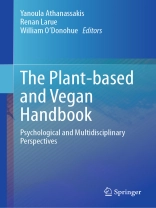The Plant-based and Vegan Handbook is the first of its kind to bring together interlocking – and sometimes conflicting – perspectives focused on veganism and plant-based living. As an interdisciplinary volume the noted contributors are from the fields of medicine, psychiatry, environmental studies, sociology, marine ecology, philosophy, agriculture, psychology, animal studies, religion, economics, literature, business, and law. Despite a range of individual preferences, these authors advance a scientific argument for a societal move away from the current model of human and nonhuman animal relationships.
In our Anthropocene era experts not only debate about how human beings will , survive on Earth, but more particularly are more concerned with how they will thrive. As evidenced by the authors in this collection, it will involve a reconsideration of the way our species relates to the planet and to other species. This volume can serve as a critical reference work, especially for students and scholars working in both emerging and established fields such as psychology, medicine, animal studies, food studies, environmental studies, philosophy, animal ethics, and marine ecology.
Tabela de Conteúdo
Chapter 1. Animals and Environmental Justice at Sea.- Chapter 2. Plant-Based Diets & Diabetes.- Chapter 3. Farm Sanctuaries.- Chapter 4. Omnivorous Diets: Comparative Environmental Impacts .- Chapter 5. Animal Ethics and the Problem of Predation.- Chapter 6. Ableism and Speciesism: Tensions and Convergence between Animal Rights and Disability Rights.- Chapter 7. One shall not make their stomach a cemetery.- Chapter 8. Ahiṃsā.- Chapter 9. Sanctuary Communities.- Chapter 10. Plant-Based Diets and Hypertension.- Chapter 11. Cellular Agriculture .- Chapter 12. Pescatarians Should Give up Eating Fish but Not Give up Entirely.- Chapter 13. More of the Flavor and None of the Flaws: Marketing Plant-Based Foods as Authentic to American and British Consumers.- Chapter 14. Abolitionism.- Chapter 15. A science-based personal investigation into what a plant-based diet can and cannot do to address cardiovascular diseases.- Chapter 16. Speciesism.- Chapter 17. Veganism and Capitalism.- Chapter 18. Economics of Circumfauna: a Fashion Case Study .- Chapter 19. New Omnivorism.- Chapter 20. Pragmatism .- Chapter 21. An Oath for Business and Animals.- Chapter 22. Vegan Stigma.- Chapter 23. Lifestyle Medicine: Mental Health and Nutrition.- Chapter 24. The Ethics of Plant-Based Pet Food.- Chapter 25. If Carnism is World Ending, Ought Vegans Proselytize?: The Logic and Rhetoric of Veganism.- Chapter 26. Title: The Impact of Plant-Based Diets on Cardiovascular Disease and its Risk Factors.- Chapter 27. `Beasts of Burden’: An Ethical Vegan Perspective on ‘Bio Diesel’.- Chapter 28. Is Veganism Socially Just?.- Chapter 29. From Lifestyle to Activism and Back: Young People’s Participation in Vegan Movements .- Chapter 30. Aliens, Antispeciesism and Vegan Advocacy.- Chapter 31. Indigenous Veganism.- Chapter 32. Plant-Based Diets and Cancer.- Chapter 33. Can Animals Be Moral Agents? Why the Debate Matters for Animal Ethics.- Chapter 34. Anthropocentrism and Its Discontents: An Intellectual History.- Chapter 35. Stockfree organic-farming for the future needs of the Planet.- Chapter 36. Zoopolis: imagining a just multi-species world.
Sobre o autor
Yanoula Athanassakis is Clinical Associate Professor in the departments of English and Environmental Studies, Associate Vice Provost of Academic Affairs, and Director of NYU’s Environmental Humanities Initiative at New York University.
Renan Larue is Associate Professor of French Literature at the University of California, Santa Barbara (UCSB).
William O’Donohue is Professor of Psychology at the University of Nevada, Reno, Director of Victims of Crime Treatment Center and the Director of Psychological Services.












